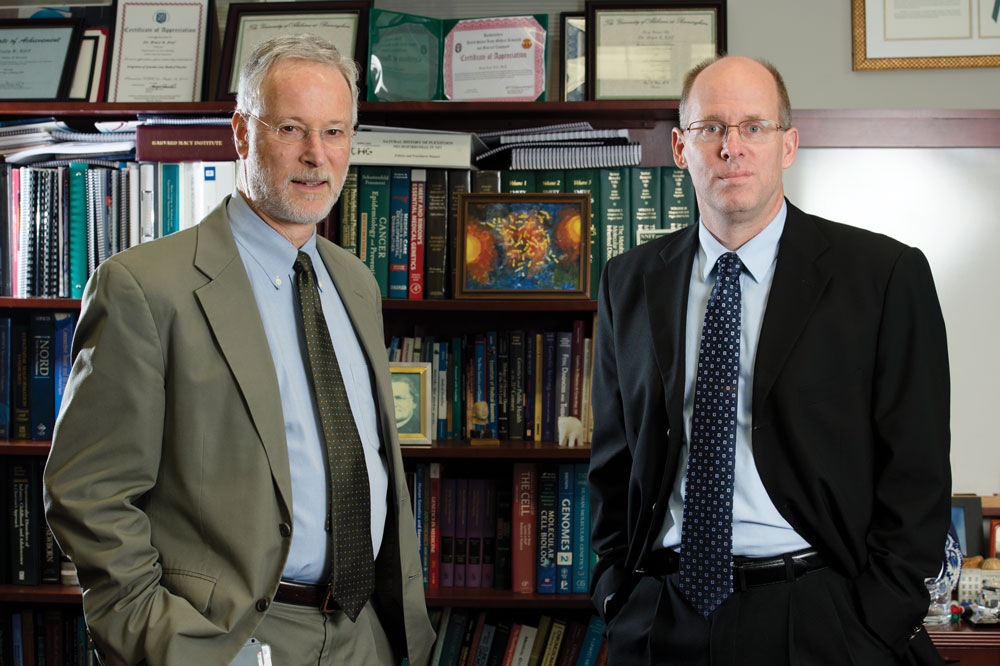 Along with UAB’s existing programs, a new undergraduate degree and a new postdoctoral research fellowship complete the training pipeline in genomic science.As precision medicine and genomics play an increasingly vital role in biomedical research and medicine, UAB has developed new programs to train the next generation of experts in the field. Along with UAB’s existing Genetics, Genomics, and Bioinformatics Graduate Theme, a new undergraduate degree and a new postdoctoral research fellowship complete the training pipeline, from undergraduate to graduate to postdoctoral training, in genetic and genomic science.
Along with UAB’s existing programs, a new undergraduate degree and a new postdoctoral research fellowship complete the training pipeline in genomic science.As precision medicine and genomics play an increasingly vital role in biomedical research and medicine, UAB has developed new programs to train the next generation of experts in the field. Along with UAB’s existing Genetics, Genomics, and Bioinformatics Graduate Theme, a new undergraduate degree and a new postdoctoral research fellowship complete the training pipeline, from undergraduate to graduate to postdoctoral training, in genetic and genomic science.
“Genomics is a relatively new and rapidly evolving area of medical research and practice,” says Bruce Korf, M.D., Ph.D., the Wayne H. and Sara Crews Finley Chair in Medical Genetics, chair of the Department of Genetics, and chief genomics officer for UAB Medicine. “UAB is qualified to be a leader in this area because our broad and deep clinical expertise, the access to genomic technologies and expertise at HudsonAlpha, and the high prevalence in our region of diseases such as diabetes and cancer that lend themselves to genomic approaches to develop better management strategies.”
This fall, UAB launched the new undergraduate degree in Genetics and Genomic Science (GGS), a joint program between the School of Medicine’s Department of Genetics and the College of Arts and Sciences’ Department of Biology. It is the only program of its kind in the state. Along with Genetics faculty members Anil Challa, Ph.D., Kevin Dybvig, Ph.D., and Daniel Bullard, Ph.D., who also serves as assistant dean for undergraduate biomedical programs for the School of Medicine and director of the GGS degree program, collaborators from the Department of Biology include Chair Steven Austad, Ph.D., and Asim Bej, Ph.D., professor and co-director of the GGS degree program.
 Bruce Korf (left) and Daniel Bullard (right) are leaders in genomics training.“UAB is fast becoming one of the top places in the Southeast to study biomedical sciences, and adding this undergraduate degree gives us new opportunities to attract more outstanding students,” says Bullard. Faculty from both the Departments of Genetics and Biology are involved in teaching GGS students, but other departments such as Chemistry, Computer and Information Sciences, and Mathematics also contribute courses to the curriculum. In addition, new classes have been developed specifically for the program, including Genome Structure and Organization, Genetic Basis of Human Disease, Personalized Genomic Medicine, and Bioinformatics.
Bruce Korf (left) and Daniel Bullard (right) are leaders in genomics training.“UAB is fast becoming one of the top places in the Southeast to study biomedical sciences, and adding this undergraduate degree gives us new opportunities to attract more outstanding students,” says Bullard. Faculty from both the Departments of Genetics and Biology are involved in teaching GGS students, but other departments such as Chemistry, Computer and Information Sciences, and Mathematics also contribute courses to the curriculum. In addition, new classes have been developed specifically for the program, including Genome Structure and Organization, Genetic Basis of Human Disease, Personalized Genomic Medicine, and Bioinformatics.
The program also offers a variety of research opportunities to honors-level students with some of the more than 100 faculty members from over 15 departments and six schools who conduct genetics and genomics research.
Through a partnership with Huntsville’s HudsonAlpha Institute for Biotechnology, UAB has also launched the UAB-HudsonAlpha Genomic Medicine Research Training Program. Funded by a grant from the National Institutes of Health—one of the first such grants in the country—the two-year program trains two postdoctoral fellows per year, for a total of four trainees. The training program is geared toward people from M.D., Ph.D., and M.D./Ph.D. backgrounds and focuses on genomic medicine in clinical research.
“The overall goal is to provide training to M.D.s and Ph.D.s in the application of genomic approaches in addressing medical problems,” Korf says. He also notes that the program’s approach to training recognizes the diverse backgrounds fellows bring with them as they go through the program.
For example, because some participants have substantial experience in genomics and others have little or none, the program has developed a “passport” system rather than a one-size-fits-all curriculum. “We have identified competencies in genomic medicine, and we provide access to various ways of achieving those competencies,” Korf says. “Trainees can check off the things they have mastered, either from prior training or training in the program, as they gain those competencies.” Competencies include the ability to analyze whole exome or whole genome data to identify variants associated with a patient’s phenotype, or the ability to select the most appropriate genomic tool to establish a diagnosis or formulate a treatment plan.
Korf says the program’s short-term goals include publications and presentations at national meetings. “The ultimate goal is to train people who go on to have successful careers in genomic medicine practice and research, either in academia or industry.”
By Nancy Mann Jackson